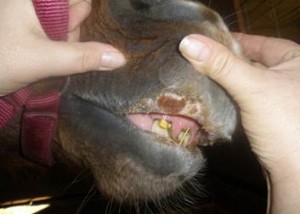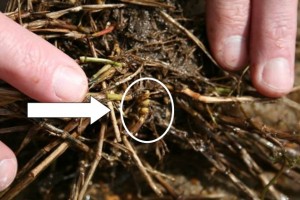Co-authored with Jeff Via (UT Extension, Fayette County).
For some time, Extension Agents have preached that properly managed pastures and hayfields can provide much of the feed needed for livestock (horses and cattle). We taught that when well-managed, theses forages can provide an inexpensive, high quality feed. Poorly managed pastures and hayfields, on the other hand, are unattractive and could potentially be the cause of some health/nutritional problems.
While controlling grasses in a grass hayfield has been an issue for many, it wasn’t until a couple of years ago a few agents started receiving calls on hard to control foxtails. At this time, a new product Pastora (Nicosulfuron + metsulfuron) was registered for use in bermudagrass. Pastora is a premix of the active ingredients in Accent and Escort herbicides.
Applications of 1 oz./acre gave good control of johnsongrass, broadleaf signalgrass, barnyardgrass, fall panicum, annual foxtails and many broadleaf weeds. However, even with proper use and good management of this new material, some well-managed hay fields began to look poorly managed. This left producers, Extension and Specialists and agribusiness representatives scratching their heads. Numerous trips were made to these fields to try to diagnose the problem. The biggest issue was lack of foxtail control.
Foxtail is a major issue for hay producers and buyers due to the ulcers that some horses get if they consume hay containing it (look at picture).
In many fields, Pastora or Pastora plus glyphosate gave limited control of foxtail. It was not until about a month ago that the troublesome foxtail was identified as knotroot foxtail, Setaria parviflora, a perennial foxtail and it has been confirmed in a number of hayfields in Fayette and Shelby counties. Easy to identify, this perennial has fibrous roots with short, knotty rhizomes (look at picture). Apparently, a species shift from the more easily controlled grass weeds, to a predominance of knotroot foxtail in many fields.
This year, many producers have applied a dormant spray of paraquat or glyphosate or a combination of one of those with pendimethalin at varying rates. The fields that had the higher rates of pendimethalin showed better suppression of the seedling perennial and annual foxtail to date. Other fields had both perennial and seedling foxtail coming up after a glyphosate/pendimethalin treatment. Not sure the reason why the seedlings came up but probably due to too much rain. Rain is needed to activate the pendimethalin but not too much. One thing to note, the pendimethalin will do nothing to the perennial foxtail plants already in the field.
A limited amount of research has been conducted in states south of Tennessee (where knotroot foxtail is more prevalent) and the results show that even the most effective treatments (Pastora or Pastora plus glyphosate) only provide suppression of the weed. To date, no treatments have been identified that provide complete control.
As of this posting, perennial foxtail is 8-10 inches in height in many fields with seedlings coming up as well. In a normal year, our recommendation would be to apply a dormant spray for winter weeds and then apply Pastora at 1.5 oz./acre + glyphosate (8 oz./ acre of a 4 lb./gal. product) with a non-ionic surfactant at 1 qt./100 gal. 3-5 days after first cutting for knotroot foxtail suppression. This could then be followed by 1 oz./acre Pastora or Pastora plus glyphosate10-14 days later if the weeds try to recover. With the warmer than normal temperatures this year and the rapid early growth of the foxtail, troublesome fields may need to be treated prior to first cutting.
Producers can expect reduced growth and discoloration of the bermudagrass following applications of Pastora or Pastora plus glyphosate. This is temporary and the bermudagrass will recover. Remember according to the Pastora label we cannot apply more than 2.5 oz./acre per season. As is the case with all agricultural chemicals, be sure to read and follow label directions and precautions.




Put out Trial today with help of Jeff Via, Becky Muller, Mike Dennison. Prowl H2O was put out early March before and then we utilized various combo’s of Pastora, Plateau, Glyhposate…we’ll see what we happens. No guarantees just trying to get a handle on this weed. Mr. Via and Ms Muller are dedicated to finding answers…It obvious our tax dollars are on the JOB!!!
Thanks Greg!!!!! Looking forward to working with you again.